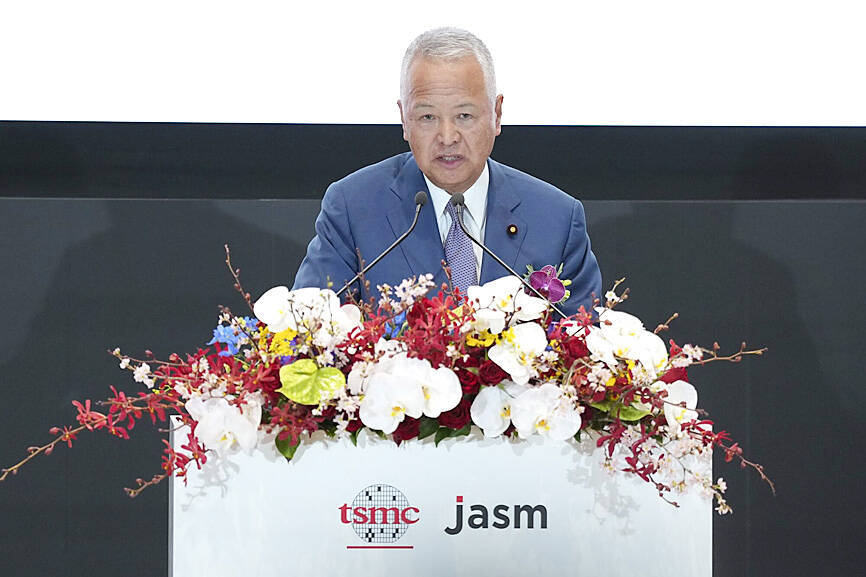The US cannot achieve a totally independent semiconductor supply chain, as it needs partners, including Taiwan, to provide key components and engineering talent, Japan’s former “chip czar” Akira Amari said in Taipei yesterday.
In his address at the Yushan Forum, Amari said US President Donald Trump is aiming to achieve full self-sufficiency for the US in the semiconductor industry.
Toward that end, Trump has persuaded Taiwan Semiconductor Manufacturing Co (TSMC, 台積電) to pledge an additional US$100 billion over the next few years to expand its semiconductor manufacturing operations in the US, Amari said.

Photo: Toru Hanai, Bloomberg
Even then, US self-sufficiency is “impossible,” he said.
“Allied and like-minded countries should concentrate on their strengths to build a complete supply chain rather than putting everything in America,” he said.
Taiwan, Japan, the Netherlands, Belgium and South Korea are strong in manufacturing, and ASEAN members produce high-quality chip components, he said.
“We need to combine the strengths of countries around the world,” Amari said.
The success of TSMC relies heavily on its talented engineers at all levels of the organization, he said, adding that the company’s high yield rate at its first fab in Arizona was because most of the 1,300 workers were Taiwanese.
That talent is critical to a strong chip industry, he said.
Yet the US would eventually insist that TSMC use US workers, which would be a problem, because US workers are extremely protective of their labor rights and take little initiative to do their jobs better, Amari said.
Another factor is that to prevent the leaking of confidential information, allied countries have to work together rather than go it alone, he said.

South Korea’s equity benchmark yesterday crossed a new milestone just a month after surpassing the once-unthinkable 5,000 mark as surging global memory demand powers the country’s biggest chipmakers. The KOSPI advanced as much as 2.6 percent to a record 6,123, with Samsung Electronics Co and SK Hynix Inc each gaining more than 2 percent. With the benchmark now up 45 percent this year, South Korea’s stock market capitalization has also moved past France’s, following last month’s overtaking of Germany’s. Long overlooked by foreign funds, despite being undervalued, South Korean stocks have now emerged as clear winners in the global market. The so-called “artificial intelligence

NEW IDENTITY: Known for its software, India has expanded into hardware, with its semiconductor industry growing from US$38bn in 2023 to US$45bn to US$50bn India on Saturday inaugurated its first semiconductor assembly and test facility, a milestone in the government’s push to reduce dependence on foreign chipmakers and stake a claim in a sector dominated by China. Indian Prime Minister Narendra Modi opened US firm Micron Technology Inc’s semiconductor assembly, test and packaging unit in his home state of Gujarat, hailing the “dawn of a new era” for India’s technology ambitions. “When young Indians look back in the future, they will see this decade as the turning point in our tech future,” Modi told the event, which was broadcast on his YouTube channel. The plant would convert

‘SEISMIC SHIFT’: The researcher forecast there would be about 1.1 billion mobile shipments this year, down from 1.26 billion the prior year and erasing years of gains The global smartphone market is expected to contract 12.9 percent this year due to the unprecedented memorychip shortage, marking “a crisis like no other,” researcher International Data Corp (IDC) said. The new forecast, a dramatic revision down from earlier estimates, gives the latest accounting of the ongoing memory crunch that is affecting every corner of the electronics industry. The demand for advanced memory to power artificial intelligence (AI) tasks has drained global supply until well into next year and jeopardizes the business model of many smartphone makers. IDC forecast about 1.1 billion mobile shipments this year, down from 1.26 billion the prior

People stand in a Pokemon store in Tokyo on Thursday. One of the world highest-grossing franchises is celebrated its 30th anniversary yesterday.